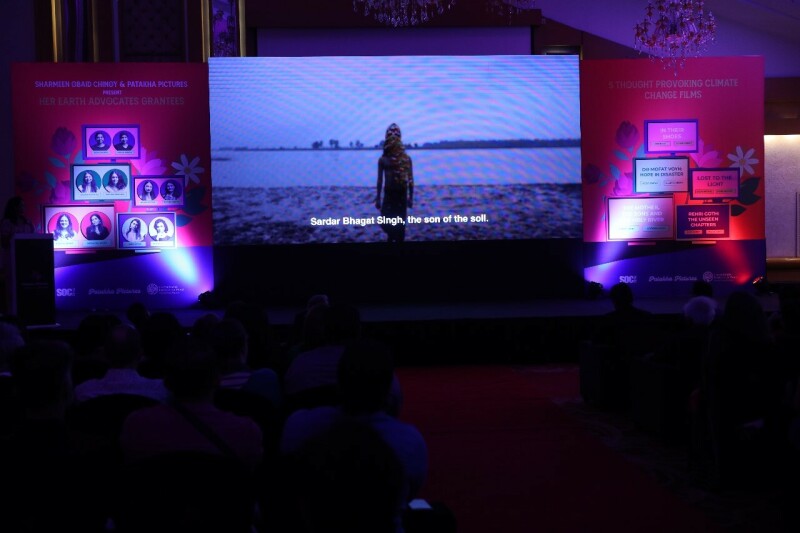Goethe Institut's Film Talents showcases nine short films on grief, forced evictions and social justice issues
The Goethe Institut organised a screening of nine very different short films produced as part of its film workshop Film Talents at the Beach Luxury in Karachi on Friday.
The films were an interesting and eclectic mix of both fiction, documentary and hybrid genres that touched upon several important issues like forced evictions, poignant themes of grief, longing and death, along with strong commentary on social justice issues like mass deforestation, minority discrimination, sexual assault and even taboos like incestuous rape.
Film Talents began in October 2019 as a film workshop that initially stalled and then went virtual for over two years. The nine films were selected from the 70 produced as part of the workshop. The films screened were All That Perishes at the Edge of Land by Hira Nabi, Dia by Hamza Bangash, A Train Crosses the Desert by Rahul Aijaz, Home is Not Safe by Sayed Masood Eslami, Secret Life of A Tree by Nadeem Al-Karimi, Azaadi by Gul Nayani, The Deadly Road by Musa Yawari, Basheeran by Fareena Aslam and Train to Home Razi Uddin.
The films were collectively produced by the Film Talents workshop director and German filmmaker Till Passow. The screening and films were sponsored by the Goethe Institut and the shortlisted films were curated by the institute’s director Simone Lenz and Passow.
The films ranged from one and a half minutes to 30 minutes and kept the audience engrossed for the entire two hours.
Hira Nabi’s short narrative documentary All That Perishes at the Edge of Land is a subtle story about shipbreaker labourers that come from all over Pakistan to wreck ships at the ship-breaking yard in Gadani. The film captures the voice of the ship being wrecked and juxtaposes it with the plight of the exploited labourers who say they are only paid enough to be saved from death, just enough to survive, but never enough to live. Nabi’s film has been shortlisted and screened at over 25 film festivals, including the prestigious Sundance Film Festival in 2020.
Rahul Aijaz's A Train Crosses the Desert is a Sindhi short film that focuses on two brothers who are both musicians. The elder is terminally ill and his younger brother is his sole caregiver who struggles to make ends meet after having sold every single musical instrument they own and quitting their music troupe. “The film is inspired by the death of my cousin who passed away from cancer. I wanted to make this film as a therapeutic retelling of loss,” Aijaz explained. A Train Crosses the Desert has made it to over 10 film festivals, including the Jaipur International Film Festival in India.

Two of the shortest films screened happened to both be films directed by women about women. Azaadi by Gul Nayani is a two-minute satirical take that contrasted the most basic demands made by women at the Aurat March against the most ridiculous accusations, sexist comments, backlash and hate that floods social media annually during and right after the march. Basheeran by Fareena Aslam is a 90-second documentary on a 70-year-old taxi driver from Hyderabad who has been driving a taxi for over 36 years and was left homeless after being abandoned by her children.
Home Is Not Safe, the only Afghani film shortlisted in the selection, by Sayed Masood Eslami, is a story of incestuous rape while Secret Life of A Tree is a magic realist hybrid documentary condemning the tri-annual tree felling practice in Hunza.
Passow mentioned in his opening address that each film was made on a shoestring budget and all films produced had gone on to be shortlisted and screened at several internationally acclaimed film festivals. Not all filmmakers could be present for the screening but five of the nine were able to make it and answer queries regarding their films as well as receive their workshop certificate.
Lenz, the director of the Goethe Institut, called Film Talents an initiative that supported young filmmakers looking to hone their craft and produce meaningful cinema that touched upon universal issues.













